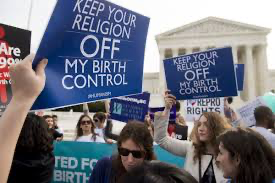Trump administration rules giving employers with religious or moral objections the right to opt out of Obamacare's requirement that they provide birth control coverage in employee health plans aren't enforceable, the Ninth Circuit said Oct. 22.
A California-led coalition of states is likely to succeed on its argument that the U.S. Health and Human Services Department, the Labor Department, and Treasury lacked the authority to issue rules exempting certain employers from the Affordable Care Act's contraceptive mandate, the appeals court said. The rules likely are arbitrary and capricious, the court said.
An accommodation process created by the government for the objecting employers likely didn't substantially burden the employers' religious exercise in violation of the Religious Freedom Restoration Act, the court said. And the states would be irreparably harmed if the exemptions were allowed to take effect, it said.
The court's decision blocks the administration from enforcing the rules in California, Delaware, Virginia, Maryland, New York, Illinois, Washington, Minnesota, Connecticut, North Carolina, Vermont, Rhode Island, Hawaii, and the District of Columbia.
The U.S. Court of Appeals for the Third Circuit recently affirmed a lower court order that blocked enforcement of the rule nationwide. The Ninth Circuit said that decision didn't prevent it from considering the same issue.
Religious groups and the federal government have asked the U.S. Supreme Court to review the Third Circuit's decision.
The case involves the contraceptive mandate, which has been one of the most frequently litigated sections of the ACA. Employers with strong religious convictions, or ties to religious organizations, have maintained they can't comply with it or with the accommodation without violating their beliefs.
The controversy went up to the U.S. Supreme Court, but wasn't resolved. The high court sent multiple cases back to lower courts with directions to work out a compromise that would balance religious groups' rights to practice their religions without substantial government interference against the government's goal of ensuring all women have access to appropriate preventative care.
The Trump administration in 2017 adopted interim final rules exempting employers with religious and moral objections from the coverage mandate. The rules were finalized in 2018, but haven't take effect.
The Ninth Circuit previously affirmed an injunction against the interim rules, but narrowed it to cover only the plaintiff states.
Judge J. Clifford Wallace wrote the opinion, which was joined by Judge Susan P. Graber. Judge Andrew J. Kleinfeld dissented, saying the Third Circuit's decision rendered this case moot.
The California Attorney General's Office is lead counsel for the states. The U.S. Department of Justice represents the government. The Becket Fund for Religious Liberty represents intervenor The Little Sisters of the Poor Jeanne Jugan Residence. Alliance Defending Freedom represents intervenor March for Life Education and Defense Fund.
The case is Caifornia v. U.S. Dep't of Health & Human Servs., 9th Cir., No. 19-15072, 10/22/19.
BloombergLaw, October 22, 2019
###
October 23, 2019
Voices4America Post Script. Share that 62 million more women will have access to birth control as a result of this ruling. #SeparateChurchFromState
As an aside, did you ever hear Trump Toady William Barr at Norte Dame?
Jeffrey Toobin wrote this summary in the New Yorker, “Perhaps the most galling part of Barr's speech, under current circumstances, is its hymn to the pious life. He denounces "moral chaos" and "irresponsible personal conduct," as well as "licentiousness—the unbridled pursuit of personal appetites at the expense of the common good." By contrast, "religion helps teach, train, and habituate people to want what is good."
Have a listen and be sick, you secularist you.
n
